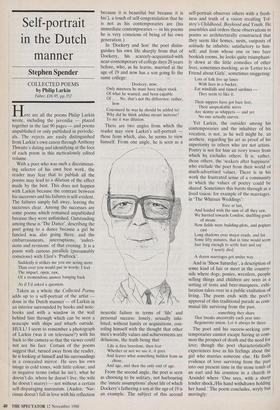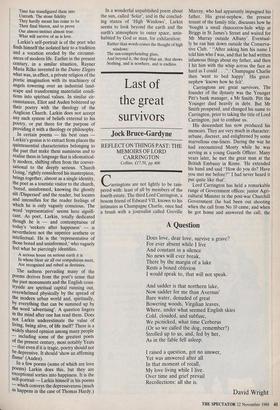Self-portrait in the Dutch manner
Stephen Spender
COLLECTED POEMS by Philip Larkin
Faber, £16.95, pp.352
Here are all the poems Philip Larkin wrote, including the juvenilia — placed together in the last 90 pages — and poems unpublished or only published in periodic- als. The rejects are easily distinguished from Larkin's own canon through Anthony Thwaite's dating and identifying at the foot of each poem in this meticulously edited volume.
With a poet who was such a discriminat- ing selector of his own best work, the reader may fear that to publish all the poems may lead to a dilution of the effect made by the best. This does not happen with Larkin because the contrast between his successes and his failures is self-evident. The failures simply fall away, leaving the successes clear. Among the successes are some poems which remained unpublished because they were unfinished. Outstanding among these is 'The Dance', describing the poet going to a dance because a girl he fancied was also going there: and the embarrassments, interruptions, 'indeci- sions and revisions' of that evening. It is a poem with curious parallels (presumably conscious) with Eliot's 'Prufrock'.
Suddenly it strikes me you are acting more Than ever you would put in words: I feel The impact, open, raw,
Of a tremendous answer banging back As if I'd asked a question.
Taken as a whole the Collected Poems adds up to a self-portrait of the artist — done in the Dutch manner — of Larkin in an interior surrounded by books and note- books and with a window in the wall behind him through which can be seen a seascape with ships and wharfs outside. HULL! I seem to remember a photograph of Larkin (was it on television?) with his back to the camera so that the viewer could not see his face. Certain of the poems suggest that, turned away from the reader, he is looking at himself and his surroundings in a concealed mirror. He sees his own image in cold tones, with little colour, and in negative terms (what he isn't, what he doesn't do, where he doesn't live, the wife he doesn't marry) — not without a certain self-disparaging narcissism. (Auden: 'Nar- cissus doesn't fall in love with his reflection
because it is beautiful but because it is his'), a touch of self-congratulation that he is not as his contemporaries are (his immediate contemporaries — in his poems he is very conscious of being of his own generation.)
In 'Dockery and Son' the poet distin- guishes his own life sharply from that of Dockery, his scarcely-acquainted-with near-contemporary of college days 20 years before, who, as he learns, married at the age of 19 and now has a son going lb the same college:
Dockery, now: Only nineteen he must have taken stock Of what he wanted, and been capable Of. . . No, that's not the difference: rather, how Convinced he was tie should be added to! Why did he think adding meant increase? To me it was dilution.
There are two angles from which the reader may view Larkin's self-portrait — those from which, also, he seems to view himself. From one angle, he is seen as a neurotic failure in terms of 'life' and personal success: lonely, sexually inhi- bited, without family or acquisitions, con- soling himself with the thought that other men's worldly values and achievements are delusions, the truth being that Life is first boredom, then fear Whether or not we use it, it goes.
And leaves what something hidden from us chose, And age, and then the only end of age.
From the second angle, the poet is seen as choosing to be solitary, not harbouring the 'innate assumptions' about life of which Dockery's fathering a son at the age of 19 is an example. The subject of this second
self-portrait observes others with a fresh- ness and truth of a vision recalling Tol- stoy's Childhood, Boyhood and Youth. He assembles and orders these observations in poems so architecturally constructed that they seem like homes, nests, outposts of solitude he inhabits: satisfactory to him- self; and from whose one or two bare bookish rooms, he looks quite triumphant- ly down at the little comedies of other lives, sometimes mocking, as in 'Letter to a Friend about Girls', sometimes sniggering:
Lots of folk live up lanes With fires in a bucket, Eat windfalls and tinned sardines — They seen to like it.
Their nippers have got bare feet, Their unspeakable wives Are skinny as whippets — and yet
No one actually starves.
Yet Larkin, the outsider among his contemporaries and the inhabiter of his vocation, is not, as he well might be, an aesthete, regarding his art as proof of his superiority to others who are not artists. Poetry is not for him an ivory tower from which he excludes others. It is, rather, those others, the 'seekers after happiness' who exclude the poet from their world of much-advertised values. There is in his work the frustrated sense of a community in which the values of poetry could be shared. Sometimes this bursts through as a lived vision: for example of the marriages, in 'The Whitsun Weddings':
Free at last, And loaded with the sum of all they saw, We hurried towards London, shuffling gouts of steam.
Now fields were building-plots, and poplars cast Long shadows over major roads, and for Some fifty minutes, that in time would seem Just long enough to settle hats and say 1 nearly died, A dozen marriages got under way.
And in 'Show Saturday', a description of some kind of fair or meet in the country- side where dogs, ponies, wrestlers, people selling things and children are seen in a setting of tents and beer-marquees, exhi- laration takes over in a public exaltation of living. The poem ends with the poet's approval of this traditional parade as com- munal life surviving from the past.
. . . something they share That breaks ancestrally each year into Regenerate union. Let it always be there.
The poet and his success-seeking con- temporaries cannot escape having in com- mon the prospect of death and the need for love; though the poet characteristically experiences love as his feelings about the girl who marries someone else. He finds evidence of love surviving from the past into our present time in the stone tomb of an earl and his countess in a church in Arundel where 'One sees, with a sharp tender shock ,/His hand withdrawn holding her hand.' The poem concludes, wryly but movingly:
Time has transfigured them into Untruth. The stone fidelity They hardly meant has come to be Their final blazon, and to prove Our almost-instinct almost true: What will survive of us is love.
Larkin's self-portrait is of the poet who finds himself the isolated heir to a tradition and a vocation eroded by the circumst- ances of modern life. Earlier in the present century, in a similar situation, Rayner Maria Rilke invented in the Duino Elegies what was, in effect, a private religion of the poetic imagination with its machinery of angels towering over an industrial land- scape and transforming materialist condi- tions into spiritual values. In similar cir- cumstances, Eliot and Auden bolstered up their poetry with the theology of the Anglican Church. Larkin does not accept any such system of beliefs external to his poetry, or put there for the purpose of providing it with a theology or philosophy.
In certain poems — his best ones — Larkin's genius is to extract from places the quintessential characteristics belonging to the past that make them numinous and to realise them in language that is idiomatical- ly modern, shifting often from the conver- sational to the deeply serious. 'Church Going,' rightly considered his masterpiece, brings together, almost as a single identity, the poet as a touristic visitor to the church, 'bored, uninformed, knowing the ghostly silt /Dispersed' and the reader, but locates and intensifies for the reader feelings of Which he is only vaguely conscious. The word 'representative' seems here signifi- cant. As poet, Larkin, totally dedicated though he is — and contemptuous of today's 'seekers after happiness' — is nevertheless not the superior aesthete or intellectual. He is the 'representative of those bored and uninformed,' who vaguely feel what he piercingly identifies.
A serious house on serious earth it is In whose blent air all our compulsions meet, Are recognised and robed as destinies. •
The sadness pervading many of the poems derives from the poet's sense that the past monuments and the English coun- tryside are spiritual capital running out, overwhelmed physically by the spread of the modern urban world and, spiritually, by everything that can be summed up by the word 'advertising'. A question lingers in the mind after one has read them. Does not Larkin underestimate the value of living, being alive, of life itself? There is a Widely shared opinion among many people — including some of the greatest poets of the present century, most notably Yeats — that even if it is tragic, poetry should not be depressive. It should 'show an affirming flame' (Auden). In a few poems (some of which are love Poems) Larkin does this, but they are exceptional sorties into happiness. It is the self-portrait — Larkin himself in his poems — which conveys the depressiveness (much as happens in the case of Thomas Hardy.) In a wonderful unpublished poem about the sun, called 'Solar', and in the conclud- ing stanza of 'High Windows', Larkin seems to look beyond the earth and the earth's atmosphere to outer space, unin- habited by God or man, for exhilaration: Rather than words comes the thought of high windows:
The sun-comprehending glass, And beyond it, the deep blue air, that shows Nothing, and is nowhere, and is endless.











































































 Previous page
Previous page